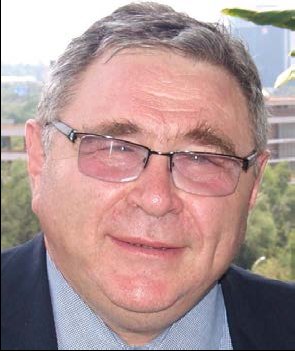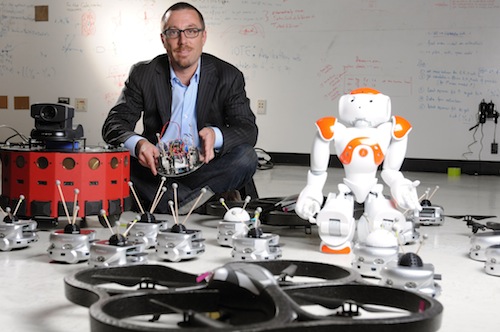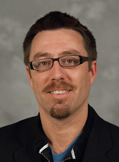IEEE JRACS Seminar on Sliding Mode Controllers by Dr. Leonid Fridman (12/12/2014)
Five Generations of Sliding Mode Controllers: Stages of Evolution
by Dr. Leonid Fridman
Please register as soon as you can, but no later than 8:00 a.m. Tuesday December 9, 2014.
| Location: Building: Dynetics, Inc., Solutions ComplexRoom Number: Main Conference Room 1004 Explorer Blvd Huntsville, Alabama United States 35806 Click here for Map |
 |
| Date: 12-December-2014 Time: 11:30AM to 01:00PM (1.50 hours) All times are: US/Central |
|
| Email meeting contact… Leandro G. Barajas, Ph.D., PMP, IEEE SM Chapter Chair, IEEE Joint Robotics and Automation – Controls Systems (JRACS) Society IEEE Huntsville Section, Huntsville, AL www.LeandroBarajas.com L.G.Barajas@ieee.org +1 (248)705-8192 |
|
No Admission Charge.
Click Here to Register
Speaker:
Dr. Leonid Fridman of Universidad Nacional Autónoma de México (UNAM)
Topic: Five Generations of Sliding Mode Controllers: Stages of Evolution
The history and evolution of sliding control will be discussed. The reason for the crisis of the first order sliding modes will be explained. The second order sliding mode control algorithms and their specific features will be presented. The control chattering of the continuous second order super-twisting control algorithm will be discussed. The precision of the arbitrary order sliding mode controllers will be shown. The continuous arbitrary order sliding mode controllers will be presented and discussed. Videos with the experimental illustration of the properties of the main sliding mode algorithms will be presented.
 Biography: Leonid M. Fridman received an M.S. degree in mathematics from Kuibyshev (Samara) State University, Samara, Russia, in 1976, a Ph.D. degree in applied mathematics from the Institute of Control Science, Moscow, Russia, in 1988, and a Dr. Sc. degree in control science from Moscow State University of Mathematics and Electronics, Moscow, Russia, in 1998. From 1976 to 1999, he was with the Department of Mathematics, Samara State Architecture and Civil Engineering University. From 2000 to 2002, he was with the Department of Postgraduate Study and Investigations at the Chihuahua Institute of Technology, Chihuahua, Mexico. In 2002, he joined the Department of Control Engineering and Robotics, Division of Electrical Engineering of Engineering Faculty at National Autonomous University of Mexico (UNAM), Mexico. His research interests are variable structure systems. Prof. Fridman is an Associated Editor of the Journal of Franklin Institute, Nonlinear Analysis: Hybrid Systems, and the Conference Editorial Board of IEEE Control Systems Society, Member of TC on Variable Structure Systems and Sliding mode control of IEEE Control Systems Society and TC on Discrete Events and Hybrid Systems of IFAC. He is an author and editor of seven books and 12 special issues and author of more than 350 technical papers on sliding mode control. He is a winner of Scopus prize for the best cited Mexican Scientists in Mathematics and Engineering 2010. He was working as an invited professor in 19 universities and research centers of Argentina, Australia, France, China, Germany, Italy, Israel, and Spain.
Biography: Leonid M. Fridman received an M.S. degree in mathematics from Kuibyshev (Samara) State University, Samara, Russia, in 1976, a Ph.D. degree in applied mathematics from the Institute of Control Science, Moscow, Russia, in 1988, and a Dr. Sc. degree in control science from Moscow State University of Mathematics and Electronics, Moscow, Russia, in 1998. From 1976 to 1999, he was with the Department of Mathematics, Samara State Architecture and Civil Engineering University. From 2000 to 2002, he was with the Department of Postgraduate Study and Investigations at the Chihuahua Institute of Technology, Chihuahua, Mexico. In 2002, he joined the Department of Control Engineering and Robotics, Division of Electrical Engineering of Engineering Faculty at National Autonomous University of Mexico (UNAM), Mexico. His research interests are variable structure systems. Prof. Fridman is an Associated Editor of the Journal of Franklin Institute, Nonlinear Analysis: Hybrid Systems, and the Conference Editorial Board of IEEE Control Systems Society, Member of TC on Variable Structure Systems and Sliding mode control of IEEE Control Systems Society and TC on Discrete Events and Hybrid Systems of IFAC. He is an author and editor of seven books and 12 special issues and author of more than 350 technical papers on sliding mode control. He is a winner of Scopus prize for the best cited Mexican Scientists in Mathematics and Engineering 2010. He was working as an invited professor in 19 universities and research centers of Argentina, Australia, France, China, Germany, Italy, Israel, and Spain.
Email: lfridman@servidor.unam.mx
Address: Departamento de Ingeniería de Control y Robótica, División de Ingeniería Eléctrica,, Facultad de Ingeniería, Universidad Nacional Autónoma de México (UNAM), D.F., Mexico, Mexico
Meeting Agenda:
11:30am – 11:45am Meet & Greet
11:30am – 11:45am Lunch
11:45am – 12:00pm Announcements & Speaker Introduction
12:00pm – 12:45pm Talk
12:45pm – 1:00pm Q&A & Adjourn



